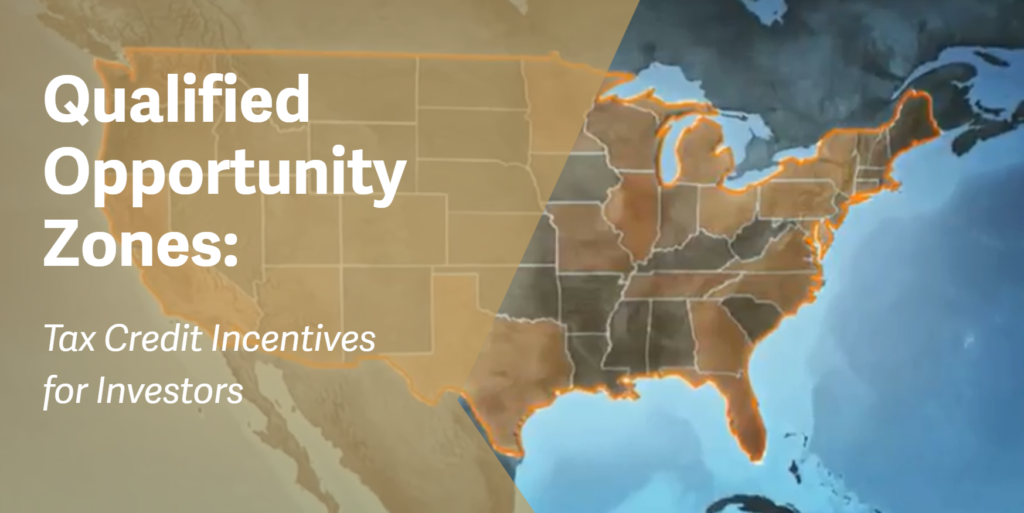
The Tax Cuts and Jobs Act that was passed in December 2017 included a tax break designed to entice investors to roll capital gains from asset sales into “struggling” areas known as Qualified Opportunity Zones (QOZ). Approximately 11,000 zones were selected and certified in April, 2018 pursuant to Rev. Proc. 2018-16. For an update of the complete list of QOZ’s approved by the Secretary of Treasury, Google “Opportunity Zones Resources, CDFI Fund”.
“I am very excited about the prospects for Opportunity Zones. Attracting needed private investment into these low-income communities will lead to their economic revitalization, and ensure economic growth is experienced throughout the nation,” said Secretary Steven T. Mnuchin in an IRS press release. “The Administration will continue working with States and the private sector to encourage investment and development in Opportunity Zones and other economically disadvantaged areas and boost economic growth and job creation.”
Investments in a QOZ or Qualified Opportunity Fund (QOF) receive preferential tax treatment. Investments in a QOZ or a QOF can retain some of this preferential tax treatment until 2046. An investor who within 180 days reinvests, can defer tax on any prior gains until the earlier of: sale of the investment or December 31, 2026, so long as the gain is invested in a QOZ/QOF. In addition, if the investor holds the investment in the QOZ/QOF for at least ten years, the investor would be eligible for an increase in its basis equal to the fair market value of the investment on the date that it is sold.
As an investor, one cannot merely invest money directly into these distressed areas. Instead, the investor must do so through a QOF, which the investor can invest in or actually set up and self-certify. The QOF can invest in a plethora of opportunities from real estate development in these zones to new tech start-ups located there. As long the fund is investing in a business opportunity to better that distressed area, fund managers have a lot of freedom to invest in just about anything, except businesses such as casinos, massage parlors, liquor stores, etc.
Investing in a QOZ/QOF, within a 180 of the capital gain realization and keeping the capital gain there for the requisite period of time, will provide the following tax incentives to investors:
-
- Postponement of the time frame to pay the capital gains tax on the original investment and possibly a 10% 15% basis increase in the original investment.
- No capital gains tax on the investment in the QOZ/QOF if the money remains in the fund for a minimum of ten years.
Let’s dig deeper since the details matter. There’s no cap on the amount of capital gain that can be invested in a QOZ/QOF. However, bear in mind that the investor will have to pay the capital gains tax, albeit diminished, on the earlier of sale, exchange of the investment or by December 31, 2026. So, it is advisable that funds be set aside to pay the tax so that the investor will not be obligated to pull out funds from the QOZ/QOF and, thereby, reduce the tax benefits. To be more specific, if the investor holds his/her interest in the QOF for at least five years, he/she will receive a basis increase in the investment that equals 10% of the deferred gain invested in the fund. Add an additional two years holding the investment, and the basis will increase by another 5%.
Now, the best part (in addition to the above)… If the investor holds the QOF investment for at least ten years, there will be a basis increase equal to the fair market value of the QOF investment on the date that it is sold, and the funds can remain in the QOF until 2046. That means that any gain is capital gains tax free. There may be other ordinary income issues if the investor receives sheltered distributions while the money is in the QOF.
The fund itself has requirements, too. The QOF must invest 90% of its assets in QOZ property and improve that property by a certain percentage, and there are situations wherein the QOF may delay its investment for 31 months. There is also a 70% business tangible property rule that must also be met. None of this will affect the investor’s counting period unless the QOF fails to invest properly and in time…
There is one final point that is rarely if ever discussed. Should the QOF investor die before the expiration of the mandatory holding period or prior to the QOF manager selling/liquifying the position and the investor, or the investor’s estate, does not have sufficient assets to pay estate taxes, the position may have to be sold (generally at a discount) or borrowed against (very costly). And, if the position is sold prematurely, the tax benefits will be lost.
Essentially, this is analogous to a failed Grantor Retained Annuity Trust (GRAT) wherein the grantor dies before the GRAT ends and the asset is brought back into the estate. In the instance of the QOF investment, if it is anticipated that there will not be sufficient liquidity at hand, then the investor should acquire life insurance for at least ten years, or maybe more as a grantor would do for a GRAT to mitigate the potential adverse tax consequences. Please be aware that the QOF manager will sell when s/he feels the time is right, not when the investor or his/her estate needs the liquidity. And, it may be possible for the manager to trade one property for another (IRC §1031) and keep the fund tied up in the QOF for an extended period of time-well in excess of ten years.
We have just presented the proverbial tip of the iceberg. There is much more beneath the waterline. We welcome the opportunity to explain how the new tax laws affect your estate planning, and how to get the most out of it.
Please feel free to give us a call at The Unger Company Ltd., 212-755-4777.

